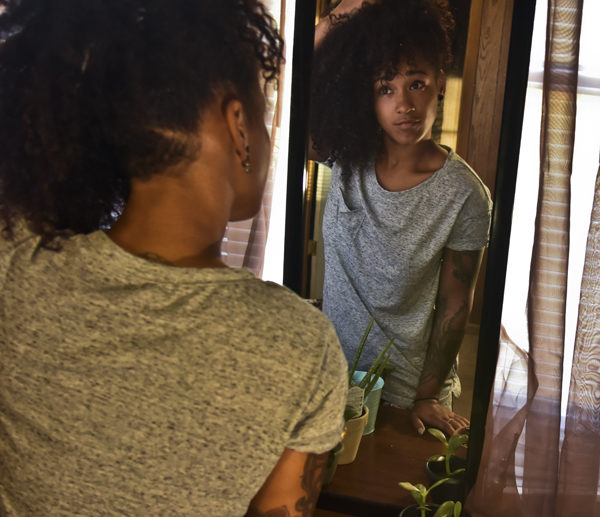South Africa protest spurs SIU students to remember their roots, embrace natural hair

Ciara Nixon, a junior from Danville studying forestry and environmental sciences, styles her hair Sunday, Sept. 11, 2016, at her house in Carbondale. “I have, in the past, been looked down upon and judged for my funky curls,” Nixon said. “When I was in the fourth grade, I begged my mom to pay for a perm to make it straight like ‘white girls’ hair.” She said throughout junior high she straightened it because she was uncomfortable with the “nappy” look. “It wasn’t until college that I let my natural curls back out,” she said. (Autumn Suyko | @AutumnSuyko_DE)
September 13, 2016
For years, black people have altered and damaged their natural hair to fit into a society where some say it is seen as unprofessional or messy.
On Aug. 29, a group of students at the Pretoria High School for Girls in South Africa got into a standoff with the school’s security guards for refusing to abide by a new policy requiring girls to tame their natural hair.
Braids and straightened hair are OK, the school’s new code of conduct stated — afros are not. Under pressure from students and an online petition, the school decided to review its policy, according to the Washington Post.
Advertisement
A few days later, the policy restrictions were dropped, but not before spurring global conversations.
Naturalistas, a Registered Student Organization at SIU, discussed the protest at one of its recent meetings, along with other perceptions of natural hair.
Chloe Coleman, the organization’s president, said the importance of the RSO for men and women alike is to learn how to embrace and care for natural hair.
“People need to understand their natural hair and that it’s OK to wear it,” she said.
Coleman, a junior from Aurora studying management, said not allowing women to wear their real hair is ignorant.
“You can’t tell me what grows out of my head isn’t tamed enough,” Coleman said. “Don’t ask to touch my hair. I’m not an animal.”
Members of Naturalistas, which began in 2003, also talked about the history of African hairstyles — including twists, locs, cornrows and afros. The group also teaches braid techniques and engages in community service.
Advertisement*
Coleman said she joined Naturalistas to learn about how to take care of her hair.
“Growing up, we weren’t taught natural hairstyles — only how to straighten or perm our hair,” she said.
Africana Studies professor Pamela Smoot, who also serves as the director of the College of Liberal Arts, called the South African school hair restriction policy ridiculous.
“Afros came from the black power movement and the braids came from Africa,” Smoot said. “Our hairstyles are something nobody else can do with their hair. All of our hairstyles come from Africa. It’s a cultural thing.”
Coleman wasn’t the only person who believed the South African hair conflict also reflected obstacles for students in America.
“I haven’t been asked to manipulate my hair, but felt obligated to do so because how society presents professionalism,” said Alex Whitley, a senior from St. Louis studying psychology. “It doesn’t look like me.”
Romello Radford, a junior from Chicago studying Africana Studies, said embracing his natural hair didn’t come without its struggles. His high school dean, he said, wouldn’t allow students to have afros longer than two inches, locs or braids.
For Mac Anderson, a barber at Kampus Kuts — which provides cuts, braids, locs and straightening methods — he said the South African hair protest is a reflection of a worldwide motivational movement to embrace natural hair.
“It’s going on here, South Africa, Brazil and Columbia,” Anderson said. “It’s a chain reaction.”
Staff writer Tyra Wooten can be reached at [email protected] or on Twitter @twootenDE.
To stay up to date with all your southern Illinois news, follow the Daily Egyptian on Facebook and Twitter.
Advertisement








